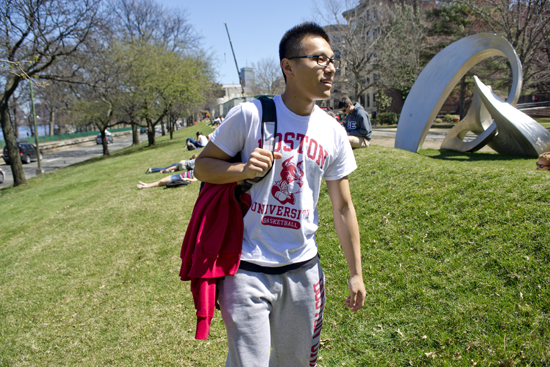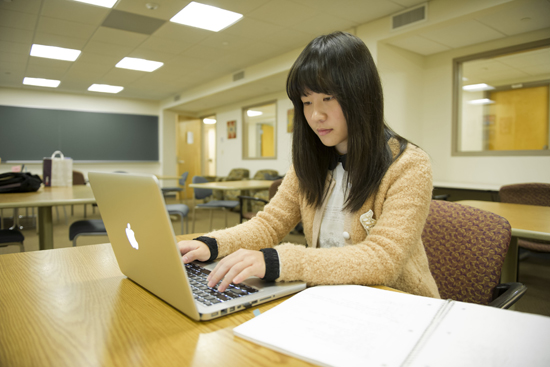Chinese Students Adjust to American Education
When East meets West, differences abound

Lili Gu (ENG’13) says he worked harder at BU than his counterparts at Chinese universities do. Photo by Vernon Doucette
Lili Gu recalls his initial trepidation at the flood of white faces in his Massachusetts high school when he came to America for 10th grade. There was the hulking football player who noticed that Gu was lost one day and said—here, Gu speaks in a guttural half-grunt—“‘Hey, you want to go to the gym?’ And I’m like, dude, is this guy going to rob me?” He struggled with English, too. The writing skills he arrived with, he says, would be at home in the fourth grade. But an English-as-second-language program made him comfortable after a semester. Then his formidable Chinese secondary education kicked in.
Gu (ENG’13) says he breezed through high school, especially math, sprinting through the curriculum and into Harvard night school for advanced calculus. The easy ride ended at BU, however. If Chinese high schools are more rigorous than those in the United States, the reverse is true for universities, Gu says. Back home, “as soon as you step in the front door of a great university, it’s almost like your motivation ends, because in China, GPA is not a big deal. Whether I’m a C student or D student, as long as I have that diploma, I’m awesome. If I wanted to graduate from BU with Cs, I’d probably have had a very good time.”
The differences between Chinese and U.S. education matter in both countries, as students from the People’s Republic surge onto American campuses. That includes BU, where Chinese students are the largest foreign contingent (about 2,000 undergraduates and grad students, 6 percent of the total) in an increasingly international student body.
A new book by Jin Li, Cultural Foundations of Learning: East and West, argues that the two systems fundamentally diverge: our Western education aims to convey knowledge to comprehend the world, while Chinese schools stress learning as a means to develop inner virtue. New York Times columnist David Brooks celebrates this supposed Chinese approach, crediting it with “awesome motivation explosions.”
But Li is middle-aged—she grew up during China’s 1966–1976 Cultural Revolution—and Chinese students here think her take is outdated. “Seriously? Cultivate virtues? I don’t think so,” says Yijing Lu (SMG’15).
Instead, the students interviewed by BU Today characterize the differences like this: Chinese high schoolers bust butt compared with their American counterparts in pursuit of the Holy Grail of university admission. “Failing the college entrance exam means the end of the world,” says Lu, whose high school forbade dating because it was a distraction from studying. Once at a university, however, many students in China goof off, either from burnout in high school or simply because they can. “Some of my friends who study in Chinese colleges tell me that they play the video game Dota day and night,” says Lu.

There’s also truth, according to our interviewees, to the claim that Chinese education stresses the memorization of facts, while BU, and by extension other US schools, demands self-education outside the classroom and practical applications of the class knowledge they impart.
“Schools in China equal boring and pure memorizing,” says Lu. “Schools in the United States are places of studying.”
Ying “Phoebe” Zhang (CAS’15) says the Chinese have a phrase, “learning machines,” for students who pursue top grades out of obedience to demanding parents, and they’re not universally celebrated. “For my parents, they don’t want me to be a learning machine,” she says. “You have to learn how to be a human, how to get along well with others.”
At the same time, says Haisu Yuan (CAS’14, COM’14), China is bathed in traditional Confucian respect for learning, and “nerds are welcomed.”
Students say adjusting to the American system was not a huge problem. For them, the main hurdles were the language barrier and occasional xenophobia. Zhang, who came to Massachusetts starting with 11th grade at a private school, remembers her roommate announcing up front “that she hates Chinese.” The roommate talked on the phone late into the night, unconcerned that she was disturbing Zhang’s sleep. Overcoming her initial hesitation about speaking up—a reserve many Chinese feel when they’re just learning English, Zhang says—“I had a really huge fight with her.” The roommate backed down, eventually becoming Zhang’s best friend.

Like Gu, Zhang found high school “super-easy.” She was one of a trio of Chinese women who got their own special class in advanced calculus. She also got some behind-the-back teasing for her smarts. “At first, it really bothered me. Later, I was like, ‘OK, just let them say what they want. This is my life. I have the control.’”
At BU, her biggest adjustment was learning to take outside-the-classroom initiative for learning, rather than being a passive receptacle of professorial lectures. “Professors are there to help you out when you have problems,” she says. “They can give you some hint. But you have to think outside of class.”
Gu and Yuan say American universities’ emphasis on student responsibility for learning is an advantage. “US schools are more about helping students to explore their individual power,” says Yuan, while in China, “study is only for exams, so all you have to do is just practice, instead of learning.”
GU was vice president of the BU Chinese Students and Scholars Association (BUCSSA), which tries to ease the adjustment for Chinese newcomers. Its efforts begin before students set foot on campus, he says. The BUCSSA uses social media to reach newcomers the summer before they arrive, offering to arrange airport pickups and transportation to dorms. Its Chinese-language orientation each fall offers guidance on things from cultural issues to keeping track of visas and other travel documents; last year, it invited a local banker to discuss (in English) how to open a bank account.
While columnist Brooks lauds Confucian learning-cum-virtue, Zhang says the question of which system is better depends most on a student’s personality. “I would say half of the Chinese students here are happy about their life,” she estimates, with the other half “desperate” to return home after graduation. “They feel kind of hopeless. They really want a sense of hope, they want to feel welcome, with people they can talk to.”
“If you have a high level of self-regulation, it’s definitely a good idea for you to come to America,” says Zhang. “You can enjoy your life, and meanwhile you are actually learning something that’s useful when you are in society later on. But if you just want to get rid of the whole pile of work in China and enjoy a vacation…forget about it. Your life will be much easier there.”

Comments & Discussion
Boston University moderates comments to facilitate an informed, substantive, civil conversation. Abusive, profane, self-promotional, misleading, incoherent or off-topic comments will be rejected. Moderators are staffed during regular business hours (EST) and can only accept comments written in English. Statistics or facts must include a citation or a link to the citation.